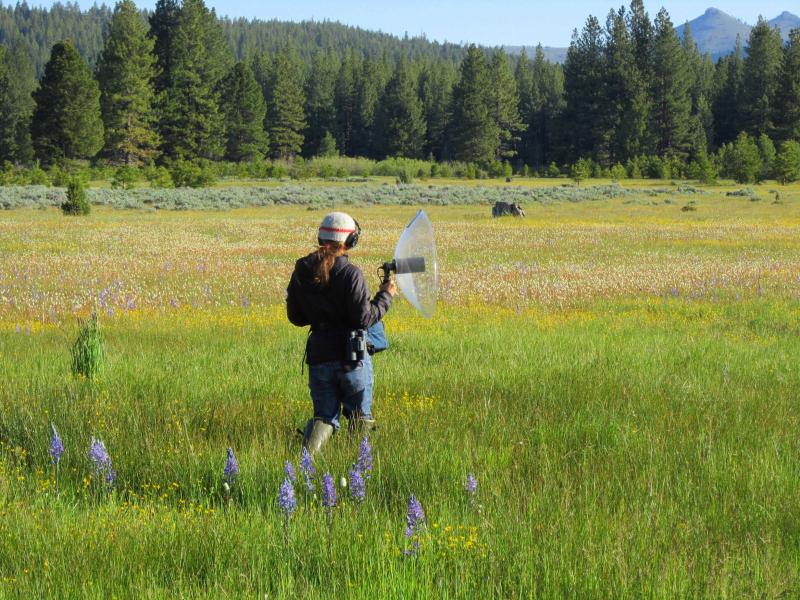Bird Song and Wildlife Sound Recording
Dates: June 7-13, 2025
Instructor: Greg Budney
Fee: $950.00 + meals and accommodations fees
Term: Summer 2025
Workshop Description
This workshop is designed for researchers, students, and individuals interested in applying bioacoustic methods to research or contributing to research in fields such as behavioral ecology, taxonomy, and conservation. Acoustic recording is increasingly used to investigate basic and applied questions about animal biology. Digital audio recording technology and computer-based software for analyzing sounds are relatively inexpensive and readily accessible, however few formal resources exist for biologists to learn how to use the equipment and software appropriately.
This workshop provides participants with essential technical skills for the capture of acoustic signals under variety of field conditions and appropriate use of acoustic analysis software relevant to basic research or conservation questions. In addition to covering best practices for recording, participants receive an introduction to the analysis of animal sounds. Through hands-on field instruction each morning participants will master field recording techniques and through afternoon lectures each acquire the conceptual background needed to support acoustic recording and research.


Instructor Bio
Greg Budney
Greg Budney Greg Budney is the former Audio Curator of the Cornell Laboratory of Ornithology's Macaulay Library and an experienced field recordist. He has conducted workshops on how to record wildlife sounds at the SNFC since 1989. Greg encourages student contact: nagra.ivs@gmail.com
Ana Luiza Camargo Catalano
Ana Catalano is an ecologist and a bioacoustician from Brazil. She currently works as an environmental consultant performining acoustic monitoring in the Amazon forest and conducts sound recording and sound identification workshops.
Travel
TRAVEL IF YOU PLAN TO FLY TO THE WORKSHOP
The closest major airport is Reno-Tahoe International Airport (RNO). Participants should plan the arrive in Reno on Friday June 6. We recommend staying at the La Quinta Inn (tel: 775-348-6100, 4001 Market St, Reno, NV 89502). Instructors will pick-up participants at the La Quinta Inn 10:30am on June 7 for the 2 hour drive from Reno to the SFSU Sierra Nevada Field Campus. Participants can choose to stay at other hotels or inns, however, they must get to the La Quinta by 10:30am on the 7th for the van ride to the Field Campus.
IF YOU PLAN TO DRIVE TO THE WORKSHOP
Please arrive at the Field Campus by noon on Saturday June 7. The physical address of SFSU's Sierra Nevada Field Campus is: San Francisco State Sierra Nevada Field Campus 35400 Hwy 49 Calpine , California , 96124 USA
Workshop Schedule
*Please note that this schedule is subject to change depending upon weather conditions, presence of bears, and logging operations.
04:45 - Coffee, tea, fruit and bread for toast.
05:10 - Vehicles depart field campus for recording site
08:30 - Breakfast in the field
09:00 - Return to field recording
10:30 - Depart field site for return to field campus
12:00 - Lunch 13:30 - Lecture and critique of field recordings
18:00 - Dinner (Note: The dinner bell is rung twice. The first bell is an alert that dinner will be served in ten minutes. The second bell is rung when dinner is ready.)
19:30 – Critical listening, possible evening presentations, and preparation for next day's field recording. Lecture topic schedule
*Please note that this schedule may be subject to change due to lecture hall & equipment availability, weather, etc.
SATURDAY
Afternoon • Introduction and issuing of loaner recording equipment followed by a field recording demonstration.
Evening • Prepare equipment for 5AM Sunday morning departure • Instructions for Sunday morning recording followed by informal drinks before dinner
SUNDAY
Morning/afternoon • Microphones • Documenting recordings
Evening • Critical listening session
MONDAY
Morning/afternoon • The digital audio recorder • Metering • Introduction to sound analysis
Evening • Critical listening session
TUESDAY
Morning • Selection of equipment
Afternoon • Sound analysis software
Evening • Critical listening session
WEDNESDAY
Morning • Multi-channel microphone techniques and equipment evaluation
Afternoon • Equipment assessment and organizing your field recording system
Evening • Critical listening THURSDAY Morning • Digital audio work stations Afternoon • General question and answer session
FRIDAY
Morning/afternoon • Soldering & cables Evening • Closing ceremony
SATURDAY
Morning • Optional field recording for those not departing (led by one or more instructors) • Departure to Reno after 7 am breakfast
Workshop Supplies List
Participants should plan to bring a complete recording system consisting of a portable digital audio recorder, microphone with windscreen, headphones, and recording media. If available, a mains power supply for the audio recorder is also recommended. A limited amount of field recording equipment is available for loan on a first-come, first-served basis. If require recording equipment, please email Greg Budney at nagra.ivs@gmail.com. Participants should also bring a laptop computer and power supply is required for the analysis instruction.
Lodging and Camping Supplies
Camping gear if you are staying on campus:
- tent and sleeping pad (unless you are staying in our tent with a cot provided)
- warm sleeping bag
- pillow, toiletries, and towel
- flashlight and lantern
- alarm clock
Field gear for everyone:
- day pack
- sunscreen
- insect repellant
- water bottles
- plastic containers for packed lunches
- sense of humor
You might also want to bring:
- camera
- binoculars
- hand lens
- camp chair
Clothing:
The weather in the Sierra Nevada can vary greatly, even in a single day. Be prepared for chilly temperatures at night, even below freezing early in the summer. Rain is a possibility any time, whether forecast or not. Variable weather clothing that can be layered is best: long pants and a long-sleeved shirt, warm sweater and jacket, t-shirt and shorts or skirt, sturdy shoes or hiking boots, rubber boots (for wet meadows and marshes), sun hat, rain gear, and a warm hat or gloves for cold weather and/or night activities. And, if you come later in the season, bring your swimsuit for afternoon dips in the lakes!